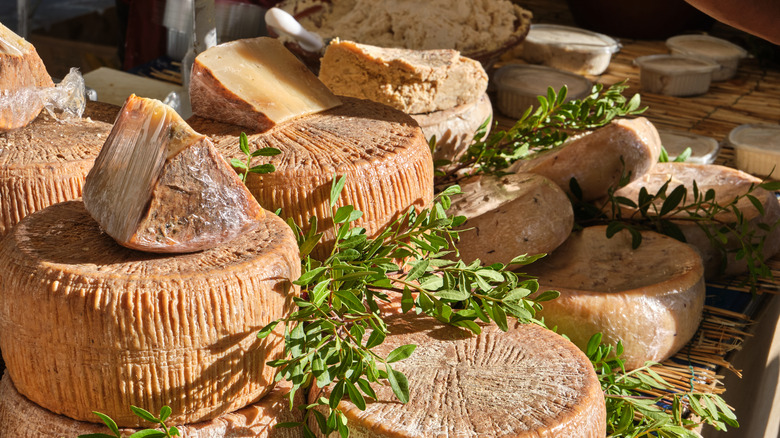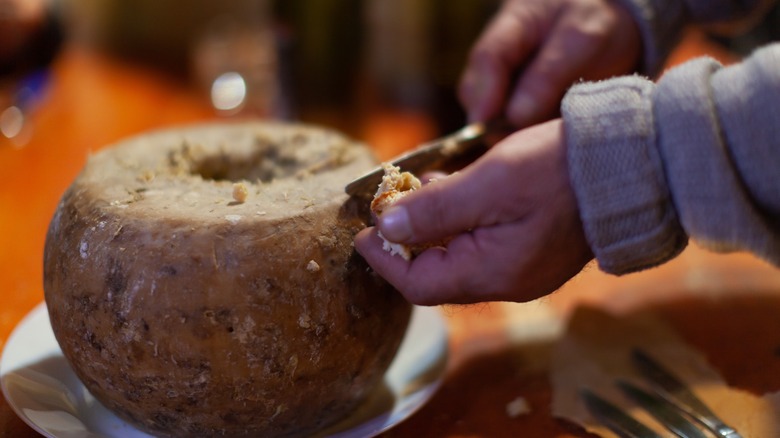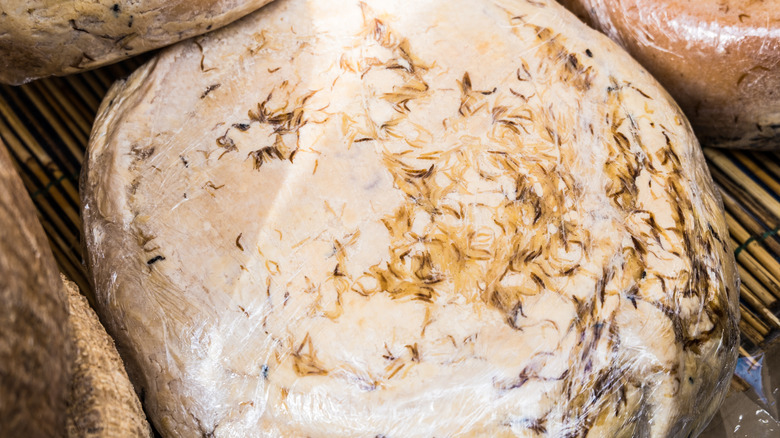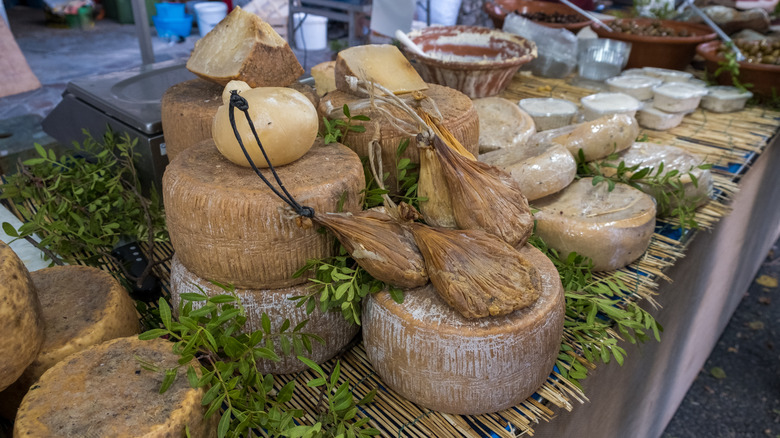What Is Sardinian Casu Marzu Cheese And Why Is It Illegal In The US?
Let's take a ride in the way-back machine. We're headed to Borneo. The year is 2000. A bunch of bandana-wearing Americans are gathered around a table wondering what's for dinner. The answer arrives in the form of squiggly wiggly live grubs. That was the first-ever food challenge on the first season of "Survivor." Based on the reactions of the contestants vying for a million dollars, you'd think they were being challenged to consume something beyond their wildest imaginations instead of a local specialty.
We've come a long way. Twenty-two years later, teams competing in Season 33 of "The Amazing Race" barely paused when they encountered a food challenge in Sardinia. Faced with chowing down on casu marzu, a maggot-infested cheese that's also a regional delicacy, most of the contestants forged ahead with nary a pause. That growing acceptance and willingness to try foods beyond the realm of our personal comfort zones that we witnessed in the microcosm of reality television challenges may be part of a greater movement.
According to The Wall Street Journal, Americans are becoming more adventurous eaters. If you're ready to follow in the footsteps of those early "Survivor" contestants, USA Today's round-up of where to eat insects in the United States suggests Chouquette Chocolates in Gaithersburg, Maryland for chocolate-covered cicadas and Bakan in Miami for dishes like salsa de hormigas chicatanas (chicatana ants salsa). But if you're craving casu marzu, you may be out of luck stateside.
The cheese that happened by accident
A staple on the Italian island of Sardinia, casu marzu has a long history. While it's difficult to pinpoint exactly when and where the cheese was created, popular theories lean toward a genesis of the happy accident variety. One common belief, according to Crickster, posits shepherds accidentally created the delicacy when, in days long before refrigeration and insulated coolers, the pecorino cheese they packed for sustenance during long stretches in the field spoiled and became infested with maggots. Hungry — and without current-day on-demand food delivery options — they ate the cheese, maggots and all. And they liked it.
In fact, it was so good that they began purposefully aging pecorino to attract Piophila casei, the cheese skipper flies that lay the eggs that hatch and become maggots, per CNN. And so begins the cycle that continues today, although in modern times, it gets a jumpstart.
According to Culture, modern-day purveyors of casu marzu cut a hole through the cheese rind and place it outdoors to attract egg-laying flies. As the larvae mature, they burrow through the cheese, digesting proteins and passing the excrement (via All That's Interesting) that gives the usually solid pecorino the decidedly creamy texture that makes it a local delicacy.
What does it taste like?
Casu marzu translates to rotten cheese, according to Britannica. But if it's rotten, why does it have such a solid fanbase? We speculate it comes down to a twist on the old adage "Beauty is in the eye of the beholder." If you like strong semi-soft cheeses like Gorgonzola, you may discover casu marzu is right up your alley. Britannica describes it as having "a very soft melting texture." To eat a like local, spread a bit of cheese on a piece of pane carasau, the same flatbread Sardinian shepherds once carried with them into the fields.
As you dip your knife into the cheese, keep an eye out for its resident maggots. The translucent larvae will be about ⅓-inch in length and should be visibly squirming. If they are not moving, the cheese is probably spoiled. Connoisseurs of authenticity swallow the worms whole, but it's acceptable to remove them before biting into the cheese. Capturing the wriggling prey can be a daunting challenge.
The Cheese Professor suggests sealing the cheese in a tightly closed paper bag immediately before serving. The worms will start pinging around inside the bag as the oxygen depletes. When the pinging stops, the worms are dead. Schmear a dollop of cheese on a piece of pane carasau and wash it all down with a glass of Cannonau. The robustly intense fruit-forward local red wine complements casu marzu's pungent flavor.
So what's the problem?
Despite a global trend toward the acceptance of insects as viable sources of protein, casu marzu is officially considered the world's most dangerous cheese — at least according to Guinness World Records. In 2009, Guinness bestowed the questionable honor on casu marzu. While it may be a delicacy in Sardinia, Guinness cited potential side effects of ingesting live maggots — "vomiting, abdominal pain, and bloody diarrhea." On the flip side, CNN reports there's no credible evidence linking casu marzu to serious intestinal ailments. Either way, it's illegal. Yes, illegal.
Or is it? CNN says the legal status of casu marzu is in flux. On a local level, it's protected as a registered traditional product of Sardinia. On a national level, the Italian government declared casu marzu illegal in 1962, citing laws prohibiting citizens from eating foods infested with parasites. According to Italian law, anyone who sells casu marzu could face a fine of up to 50,000 euros (U.S. $53,000).
Illegal but not unavailable
The European Union as a whole is starting to rethink laws that apply to the consumption of insects, especially in light of growing consumer demand and reports citing mitigation of carbon dioxide emissions resulting from traditional animal farming, according to CNN. For now, though, casa marzu remains officially off-limits in the United States and in Italy (via HowStuffWorks).
Still interested? Getting a taste of casu marzu is a bit like gaining access to an underground club. It's secretly available at locations around Sardinia, but you'll have to ask around, subtly, according to Britannica. In 2021, Sardinian gastronome Giovanni Fancello told Matador Network the best chance to get a taste of authentic casu marzu is to score an invitation to a private home. It's hit or miss, but you may luck into a tasting during a farm stay or at a rural café. Or head for the hills where shepherding families live and work. If you're politely low key, there's a chance you'll find a local willing to share a taste of the family stash.




